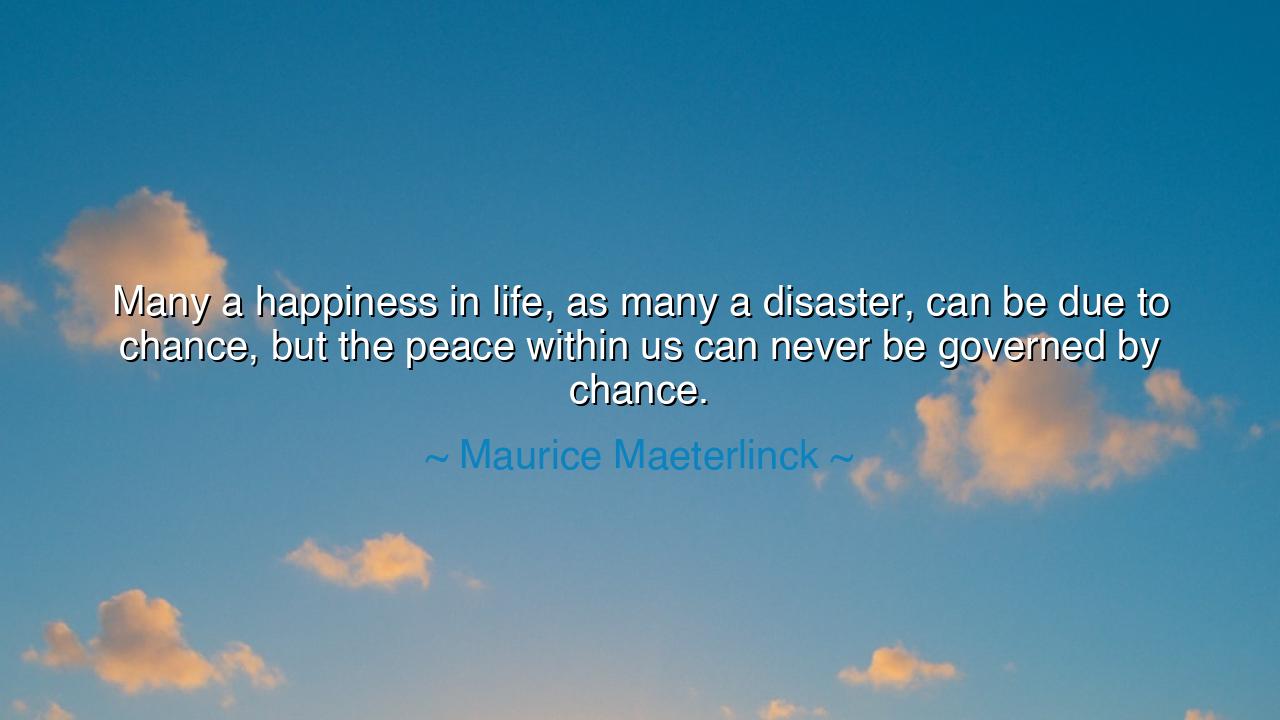
Many a happiness in life, as many a disaster, can be due to
Many a happiness in life, as many a disaster, can be due to chance, but the peace within us can never be governed by chance.






In the luminous thought of Maurice Maeterlinck, poet of the soul and seeker of unseen truths, we find a saying that glows like a lantern against the storms of life: “Many a happiness in life, as many a disaster, can be due to chance, but the peace within us can never be governed by chance.” These words, born from the meditations of a man who sought meaning beyond the visible, speak to one of the oldest and deepest questions of humankind—how to find peace in a world ruled by uncertainty. Maeterlinck reminds us that though fortune and misfortune may rise and fall like the tides, the stillness of the spirit belongs to no external power. It is a realm we alone can rule, if only we have the courage to claim it.
The origin of this thought lies in Maeterlinck’s lifelong exploration of the mystery of the inner life. A Belgian philosopher and dramatist, he wrote during an age trembling between reason and faith, when humanity sought meaning beyond material success. His words carry the calm of one who has looked into the chaos of chance—the unpredictable turns of fate, the sudden winds of joy and sorrow—and found that the only true fortress lies within. Happiness, he admits, often depends on luck: the meeting of circumstances, the favor of time, the gifts of health or fortune. Disaster, too, arrives without warning, sweeping away the works of years in a single hour. Yet peace, that sacred equilibrium of the heart, does not depend on the world’s mercy. It is not born of possession, nor destroyed by loss. It is the child of understanding, of acceptance, of wisdom that knows life’s impermanence and still smiles.
This truth is as ancient as it is profound. The Stoic philosophers of old—Epictetus, Seneca, and Marcus Aurelius—spoke in the same voice. They taught that external things are beyond our control, but the soul’s harmony rests in our power. One may lose wealth, home, or friend, yet remain free if one keeps mastery over one’s own mind. “No man is free who is not master of himself,” wrote Epictetus. Maeterlinck’s words echo this wisdom across the centuries: chance may rule the outer world, but it cannot rule the inner world, unless we surrender that dominion by fear or despair. The peace within us, once discovered, is a citadel that even fate cannot breach.
Consider the life of Viktor Frankl, the psychologist and survivor of the Nazi concentration camps. Stripped of family, freedom, and dignity, he faced the darkest cruelty of human history. Yet in the depths of horror, he found a truth akin to Maeterlinck’s: “Everything can be taken from a man but one thing,” Frankl wrote, “the last of the human freedoms—to choose one’s attitude in any given set of circumstances.” Though all happiness was denied him by chance, he found peace in the power to give meaning to his suffering. In choosing to remain compassionate, to cling to hope, he became freer than his captors. Such is the power of the inner kingdom: it cannot be conquered from without.
Maeterlinck’s insight also reveals the fragile illusion of modern life. We chase happiness as though it were a prize to be seized—through wealth, achievement, admiration—but these are toys of chance. They come and go as easily as the wind. The wise understand that peace is not built upon the changing sands of circumstance, but upon the rock of self-knowledge. It is born in silence, in gratitude, in the acceptance of what is. When a man ceases to demand that the world obey him, he discovers that the world can no longer disturb him. The storm may rage around him, but within, the flame of serenity burns steady.
Yet Maeterlinck does not call us to indifference. His peace is not the peace of numbness, but of awakened strength. To feel deeply, to grieve, to rejoice, to struggle—these are not enemies of peace, but its soil. True tranquility is not the absence of motion, but the presence of purpose. It is the knowing that even in loss, life remains meaningful; that every sorrow conceals a seed of wisdom. When we live with that awareness, we are no longer slaves to luck or misfortune. We become, as the ancients said, “self-contained worlds,” glowing from within.
Thus, the lesson of Maeterlinck’s words is both simple and sacred: Guard your inner peace as your most precious treasure. Do not entrust it to the fickle hands of chance. Cultivate it through reflection, patience, and compassion. When joy comes, receive it with gratitude; when pain comes, meet it with understanding. Let neither sway your soul from balance. For happiness may depend on fortune, but peace depends on wisdom—and wisdom is always within reach of the heart that seeks it.
And so, dear traveler on the path of life, remember: the world will turn as it pleases, indifferent to your desires. But within you dwells a kingdom untouched by its storms. Build your peace there, and chance will lose its dominion. For when the light of peace shines within, neither fortune nor misfortune can rule you—you become, in Maeterlinck’s eternal vision, the calm center of a restless universe.






AAdministratorAdministrator
Welcome, honored guests. Please leave a comment, we will respond soon